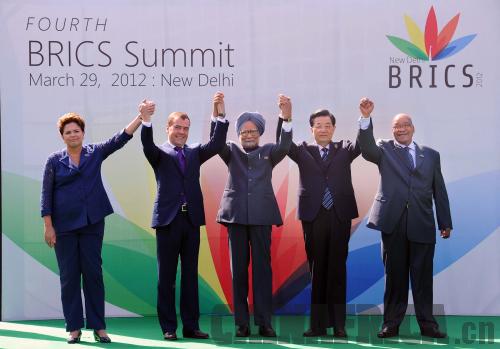|

The idea of establishing a bank run by the BRICS group was first discussed last March at the Fourth BRICS Summit in New Delhi. It has been suggested that the bank would help fund infrastructure construction and supplement the efforts of existing multilateral and regional financial institutions. This proposal has been widely regarded as a key outcome of the summit.
Brazil, Russia, India, China and South Africa are set to finalize the structure of a BRICS-led development bank at the Fifth BRICS Summit in Durban from March 25 to 27, if all goes to plan, according to analysts. The seed capital for the bank is projected to be around $50 billion, with each member country making a contribution of $10 billion.
Analysts say that if the bank is established, it will be the first multilateral bank for developing countries focusing on promoting mutual investment.
"It is our hope that BRICS members will reach a consensus on the joint bank during the upcoming summit," said Clodoaldo Hugueney, Brazil's Ambassador to China.
Deeper economic cooperation
Global economic uncertainty is the most important challenge facing developing countries, especially the BRICS countries. Experts say BRICS members should intensify trade ties and step up cooperation to speed up the establishment of the joint bank. This is particularly true in light of the fact that the BRICS nations are set to become a main driver of the global economy in 2013.
Setting up a BRICS development bank is part of a greater effort to deepen economic cooperation among group members in trade, trade financing and infrastructure construction, said Zhu Guangyao, Vice Minister of Finance, at the First Forum on the Economic Situations of BRICS Countries last December.
"BRICS nations should have a bigger say in global economic and financial affairs," he added. A joint bank could firm up the BRICS position as a powerful player in global decision-making.
This joint bank proposal has triggered speculation as to whether it would compete with other multilateral financial institutions such as the World Bank or the International Monetary Fund (IMF). But BRICS countries say the new bank would be a positive addition instead of an alternative to the international bodies, especially in developing countries.
Nandan Unnikrishnan, Vice President of India's Observer Research Foundation, suggests the joint bank diversify funding sources by issuing bank bonds and using its foreign reserves. He added that financial institutions in the West could also be allowed to finance the bank, but that the dominant shareholders should be BRICS members.
"Nowadays a lot of hot money has flown into the virtual economy, rather than the real economy. The establishment of the BRICS Development Bank would greatly alleviate such unbalanced development," said Huang Ying, Research Associate at the China Institute of Contemporary International Relations. The multilateral bank will assist the development of the real economies of developing countries, such as infrastructure construction, medical care and education, Huang added.
|